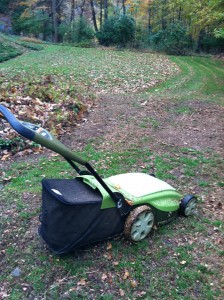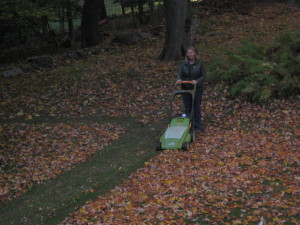When it comes to lawns, I do my best to live lightly on the earth. My yard is what I like to call an “herbal lawn” which does not require additional watering, weed killers or fertilizers. When I mow it, which is not all that frequent, I use my cordless electric Neuton mower and it is an enjoyable activity with no noise or fumes.
Unfortunately, my lawn care philosophy is the exception, not the rule here in suburbia. Most folks outsource their lawn care to landscaping companies that mow, blow and dump copious amounts of petrochemical fertilizers and weedkillers and other pesticides.
The link between pesticides and cancer has been growing over the years. Many lawn pesticides are possible and/or known carcinogens, some have been linked to birth defects, some act as neurotoxins, and others can cause kidney or liver damage.
Add a leaf blower to the mix with their 200 mph winds blasting all these particles up into the air where they remain suspended for hours, then our families and pets breathe them in. Leaf blowers are not at all needed in the spring and summer months when there are no leaves to blow. Yet for some strange reason the “lawn guys” insist on blowing after mowing.
 Many communities have created leaf mulching programs to cut back on the leaf blower madness. You can mow instead of blow. Chopped leaves are great for compost and saves time and money.
Many communities have created leaf mulching programs to cut back on the leaf blower madness. You can mow instead of blow. Chopped leaves are great for compost and saves time and money.
This fall, before you think pink, take a pause and consider the cause. Say no to leaf blowers. Your ears, your lungs and your lawn will thank you.




Thanks for highlighting this issue Susan, I must admit I hadn’t considered the implications of air borne nasties to such a degree as this. These days many leaf blowers or garden vacs have the ability to work in reverse, sucking up and mulching leaves rather than just blowing them around. Electric varieties of these models are perhaps what we should be recommending, along with electric lawn mowers as you rightly mention.
Thank you for posting about the leaf blowers. Here’s another tip: Forget bagging the grass and throwing it in the green bin. Leave the grass where it falls (Grass-Cycle). As it decomposes it will add nitrogen and organic matter to the soil. This should reduce or even eliminate any need to fertilize a well-managed lawn.